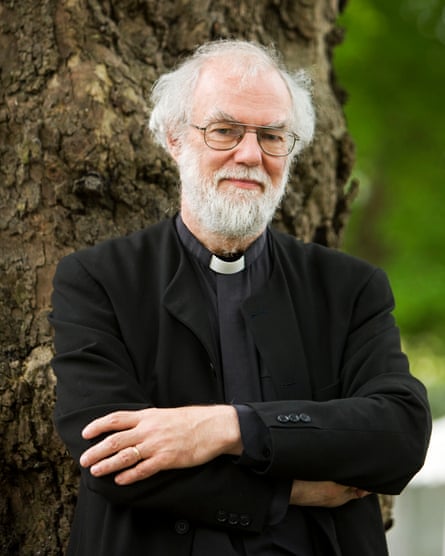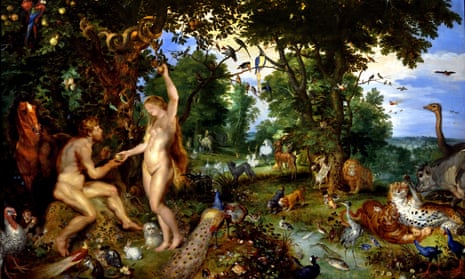The biblical account of creation and the fate of Adam and Eve, progenitors of the human race, continues to inspire artists and writers. But according to a groundbreaking new survey, it is also at the heart of a deep misunderstanding between religious and non-religious Britons.
A YouGov poll, commissioned by Newman University in Birmingham, has found that 72% of atheists polled believe that someone who is religious would not accept evolutionary science. In fact, only 19% of religious respondents in the poll rejected Darwinian thinking in favour of a literal reading of the Book of Genesis.
According to the research, nearly two-thirds of Britons – as well as nearly three-quarters of atheists – think Christians have to accept the assertion in Genesis that God created the world in six days and rested on the seventh. But just 16% of believers accept the creation myth – according to which, in the words of the questionnaire, “humans and other living things were created by God and have always existed in their current form”. Only 9% of all Britons reject evolutionary theory.
According to Professor Fern Elsdon-Baker, who led the research, the findings suggest a need to revise stereotypes when it comes to Christian belief in Britain. “In a society that is increasingly non-religious, this mismatch in perception could be seen as a form of prejudice towards religious or spiritual groups,” she said. “It may be one of the contributing factors in religious groups or individuals saying they see a conflict between science and religion.”
According to the British Attitudes Survey, religious belief is continuing to decline in Britain, but the former archbishop of Canterbury, Lord (Rowan) Williams, says the YouGov survey confirms that a presumed incompatibility between science and religion is “a phoney war”.
“The number of mainstream Christians – certainly in this country – who have qualms about evolutionary theory is very small indeed,” said Williams. “But perceptions are different, and the presence of US-style fundamentalism in the popular imagination means that a growing number who know nothing of the actual history of intellectual discussion of these questions assume that all religious believers must be committed to combating scientific accounts of the universe’s beginnings.”
The Newman University research also revealed an intriguing misconception about scientists who are also religious. One in three people polled said that they thought a scientist who is religious is much more likely than an atheist scientist to find it “very difficult, difficult or somewhat difficult to accept information about evolutionary science, in reference to their own personal beliefs or way of seeing the world”.
According to a separate survey by the Scientific and Medical Network (SMN) – a group devoted to marrying evidence-based science and spiritual practice – 25% of professionals working in science, medicine and engineering describe themselves as atheists, and 45% as religious (practising or not) or “spiritual”.

Guy Hayward, research fellow at SMN, said: “It is clear from this survey by Newman University that non-believers have very little idea about what believers believe. They seem to be responding to a caricature based on American creationists, rather than reality. Even in America, creationist beliefs in the literal truth of Genesis are not shared by most mainstream Christians. In fact, many scientists have religious or spiritual beliefs and do not see these as conflicting with science.”
The story of God’s creation of Adam and Eve, and their eventual exile from the Garden of Eden, is a bedrock of cultural history. This month, Harvard humanities professor Stephen Greenblatt published an acclaimed new volume on the subject, The Rise and Fall of Adam and Eve, which recounts the impact of the Bible narrative on Michelangelo, the poet John Milton, and German artist and printmaker Lucas Cranach the Elder, among others. Greenblatt also points out how the role of Eve, who breaks God’s law by eating an apple from the tree of knowledge, has been used to justify misogyny and was used by thinkers such as St Augustine to develop theories of man’s essential sinfulness.
According to Williams, Britain’s churches should be doing more to explain modern theological thinking on the origin of life. “Christians need to be clearer about what the doctrine of creation does and doesn’t mean,” he said. “To say that all things depend unilaterally on the eternal action of God is not the same as saying that specific steps in the universe’s history must be the direct result of divine intervention.
“Christians and scientists need to be more ready to discuss the history of scientific discovery, they need to recognise that their supposed ‘war’ is just fiction. Scientific education badly needs to develop an awareness of this intellectual history and to acknowledge that old-style mechanistic accounts of the material world are no longer adequate.”
A previous survey of Britons, in 2014, indicated that 19% of people held creationist views, suggesting a sizable (10 percentage points) drop in the past three years, although this could be due to variations in sampling methods.








